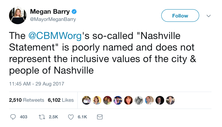 The digital world was on fire this week after the release from CBMW of the Nashville Statement, which was written as a series of affirmations and denials of what Scripture teaches about marriage, gender, and sexuality. CBMW was founded and driven by the Danvers Statement (1987) that set the stage for the recent surge in complementarianism. Complementarianism is an understanding of biblical gender roles that sees men and women equal in value, dignity, worth, and as image bearers, but with different functions in the church & home. When the Danvers statement was written, it was long before what we see today where gender identity is fluid, same-sex marriage has become not only legalized but normalized, and the "new tolerance" has created a culture largely unengaged with Danvers. One of the criticisms of the Nashville Statement was the timing of its release. It was released while the nation was focused on Harvey and the images of destruction coming from Houston. For what it's worth, I agree the timing wasn't a good look. I'm sure it was set in place weeks before, but a week or two delay in light of the national landscape may have been wise. That said, I was happy to put my name on it as a signer. I don't believe the Nashville Statement has said anything new or clever - it's affirmed an almost unanimous understanding through church history of Scripture's view on marriage, gender, and sexuality. But as pastors we don't deal with the abstractness of documents. We deal with the hurting hearts of people. Some who struggle with same-sex attraction, some who have family members who identify as a different gender, some who may not even agree with the affirmations and denials in the Nashville Statement. Now that it's been released, what shall we do? May I propose a few suggestions? 1. Listen Well - It can be very easy to be dismissive of those with whom we disagree. We don't have to read their tweet. We can roll our eyes at their concerns. But as shepherds, we must love people well enough to listen to them. We need to hear the fear and concern and hurt from those that find themselves wondering if God loves them, if we love them. It doesn't mean we agree with them, but we must display what one of my seminary professors called "Convictional Kindness." 2. Stand Firm - Where God has spoken, we must not back down. And God has spoken from the opening pages of Genesis what His design and delight are for us. He has spoken on gender, He has spoken on marriage, He has spoken on sex. And while there have been historical examples of misapplying Scripture to justify an evil (slavery, racism, eugenics, etc.), past mistakes do not automatically mean current convictions are wrong. God's design for marriage, gender, and sexuality is by nature good (Genesis 1-2), and because it is good it is for our best. 3. Love Hard - My heart broke as a former student of mine shared that he was gay. But what never changed, and never will, is my love for him and my prayer for him. We cannot love those whom we do not know, and we cannot know those whom we do not seek. Jesus did this, he came to seek and to save the lost (Luke 19:10). He didn't wait on them, He went. And He loved. And He loved people enough to tell them "go and sin no more" (John 8:11). I'll never forget what the first pastor I served under said often, "God loves you just the way you are. But He loves you too much to let you stay there." 4. Avoid the Muck - The people who wrote the Nashville Statement are adults. They knew what they were doing. They also can defend themselves. They don't need us fighting their battles for them and slinging around on Twitter. Stay above the low hanging fruit on Twitter. Keep your eyes focused on what God's called you to - to lead, teach, serve, and love the people placed under your care.  5. Buckle Up - The backlash against the Nashville Statement has been swift and from multiple directions. Even conservative Christians have taken issue with some parts of it (especially Article 10 which implies an "all or nothing" understanding). The mayor of Nashville expressed her anger at the city being attached to the document, a community of artists called The Liturgists released a counter statement, Jonathan Merritt wrote a thoughtful piece for Religion News Service, and many of us have had our inboxes and social media hit with comments, questions, and backlash. Expect that to continue. Those who hold to a "biblical" view of marriage, gender, and sexuality are moving to a minority. Our voice will no longer be one from majority or tradition, but more as the prophet calling from the outside for the city to repent and return. 6. Keep the Gospel - The end goal isn't for people to be straight or identify by their biological gender. That's missing the point. The goal is for people around the world to treasure Christ. The Gospel is the main thing - that Christ came for sinners. That includes you and me. That includes the addict, the adulterer, the guy with a secret porn habit, the young adult who runs to dysfunctional relationships, the middle aged man who thinks his job is where his treasure is, and the senior citizen who thinks there's always going to be tomorrow. The Gospel sets us free. And it sets us free from whatever we might find ourselves enslaved by. If you want proof of what the power of the Gospel can do, check out Rosaria Butterfield's testimony sometime. I love how Merritt ends his article, "Proclamations don’t shape history; people do." He's right. And as shepherds and pastors, let's lead well to see people from every tribe, nation, and tongue treasuring and worshipping Christ as Lord.
0 Comments
Leave a Reply. |
Scott M. DouglasA blog about leadership and the lasting legacy of family ministry. Archives
August 2023
Categories
All
|
 RSS Feed
RSS Feed



